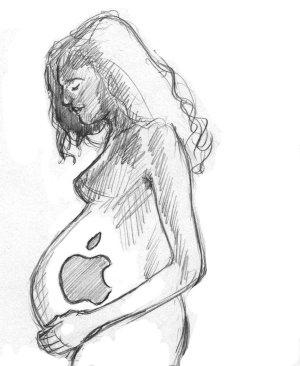Catholic Medical Quarterly Volume 62 (1) February 2012, p15
FAITH at work
The i-phone has it for adoption
Jim Curtis
Steve Jobs, who was adopted at birth and who died recently created the
iPhone. Many of my junior doctors use iphones on ward rounds to look up key
facts. None if us knew till recently that we depended upon adoption to do that.
 Sadly,
in the UK adoption has dropped to an all-time low with only 44782 children being
adopted last year. The figures showed that 80 per cent of children adopted in
2010 were born outside marriage, compared with 69 per cent in 2000. Almost 60
per cent of children who were adopted during the year were aged between one and
four, up from 41 per cent in 2000. We have often heard about the problems of
adoption, so it may be good that doctors and nurses should be aware of some very
wonderful outcomes from adoption. I for my part have several friends working in
senior positions who were brought up either as orphans or adopted children.
Sadly,
in the UK adoption has dropped to an all-time low with only 44782 children being
adopted last year. The figures showed that 80 per cent of children adopted in
2010 were born outside marriage, compared with 69 per cent in 2000. Almost 60
per cent of children who were adopted during the year were aged between one and
four, up from 41 per cent in 2000. We have often heard about the problems of
adoption, so it may be good that doctors and nurses should be aware of some very
wonderful outcomes from adoption. I for my part have several friends working in
senior positions who were brought up either as orphans or adopted children.
Jobs was reluctantly given up for adoption in 1955 after being born to Abdulfattah John Jandali, a Syrian man, and Joanne Schieble (later Simpson) , who was a graduate student at the time. They decided to give him away for adoption because the couple was not married and keeping him would have been deemed shameful by their communities. At the time, however, Joanne’s parents would not allow the two to get married. Brought up by Paul and Clara Jobs, Steve is thought to have been reconciled with his mother, but never made contact with his biological father.
When he started work in 2005 at Stanford University, Jobs described how his mother signed the adoption papers reluctantly, wanting to give him away to a well-educated couple. “It started before I was born. My biological mother was a young, unwed college graduate student, and she decided to put me up for adoption. She felt very strongly that I should be adopted by college graduates, so everything was all set for me to be adopted at birth by a lawyer and his wife. Except that when I popped out they decided at the last minute that they really wanted a girl. So my parents, who were on a waiting list, got a call in the middle of the night asking: “We have an unexpected baby boy; do you want him?” They said: “Of course.” My biological mother later found out that my mother had never graduated from college and that my father had never graduated from high school. She refused to sign the final adoption papers. She only relented a few months later when my parents promised that I would someday go to college.”
So, Jobs was given up for adoption to his parents Paul and Clara Jobs. Of course, that was 18 years before the Roe v. Wade Supreme Court decision, following which millions of abortions have seen a drop in adoption and a huge change is American culture. Writing in the Washington Times John Paul Cassil asked: “What would a world look like in which Steve Jobs had been aborted?” Out of the 52 million abortions in the US in the past 38 years, how many other Jobs’s have we extinguished?
What is clear is that if Steve Jobs had been aborted, there would be no iphone.
What is also clear is that in countries where abortion is legal, like ours,
adoption rates have fallen and that is certainly as a result of the killing of
children who would otherwise be adopted. Our ward rounds owe a serious debt to
I-phones and adoption.
References
- Abortion, Adoption, and Steve Jobs John Paul Cassil, Washington Times, Sunday, September 18th 2011, http://communities.washingtontimes.com/neighborhood/conserving-freedom/2011/sep/18/abortion-adoption-and-steve-jobs/
- How Steve Jobs's biological mother doesn't know he is dead as care home nurses believe dementia sufferer is too ill to be told. By PAUL BENTLEY. Daily Mail Online. Sunday, Oct 16 2011 http://www.dailymail.co.uk/news/article-2049426/Steve-Jobs-dead-Birth-mother-Joanne-Simpson-does-know-son-died.html
- Adoptions fall to record low, Daily Telegraph, Sunday 16 October 2011 http://www.telegraph.co.uk/family/8666241/Adoptions-fall-to-record-low.html
